Why Eye Discharge in Chinchillas Shouldn’t Be Ignored
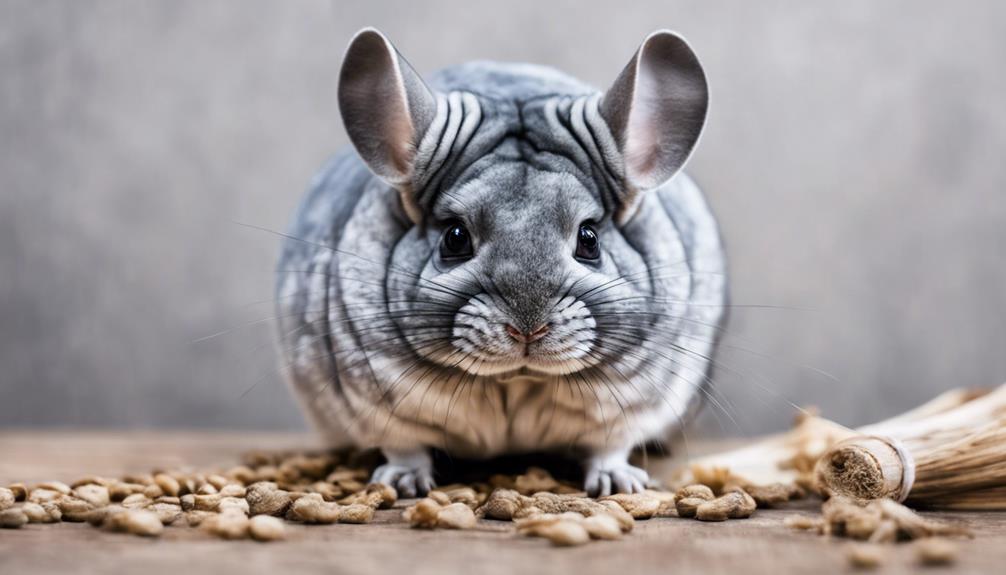
Eye discharge in chinchillas is a common issue that can indicate an underlying health problem. It is important to address this symptom promptly to prevent potential complications and ensure the well-being of the chinchilla.
Common causes of eye discharge in chinchillas include infections, allergies, injuries, or dental problems. Proper diagnosis by a veterinarian is crucial to determine the exact cause and appropriate treatment.
Ignoring eye discharge can lead to more serious conditions such as corneal ulcers or respiratory infections. Therefore, regular monitoring of your chinchilla’s eye health and seeking veterinary care at the first sign of abnormal discharge is essential for maintaining their overall health and quality of life.
Importance of Addressing Eye Discharge
Addressing eye discharge in chinchillas is crucial to maintaining their ocular health and overall well-being. Early intervention plays a vital role in preventing potential complications that may arise from untreated eye discharge. Proper care is essential to ensure the chinchilla’s eyes remain healthy and free from irritants or infections.
When eye discharge is noticed in a chinchilla, taking immediate action through early intervention is key. This involves closely monitoring the discharge, cleaning the affected eye gently with a damp cloth if necessary, and seeking veterinary care if the issue persists or worsens. Ignoring eye discharge can lead to discomfort for the chinchilla and may indicate an underlying health issue that requires attention.
Common Causes of Eye Discharge
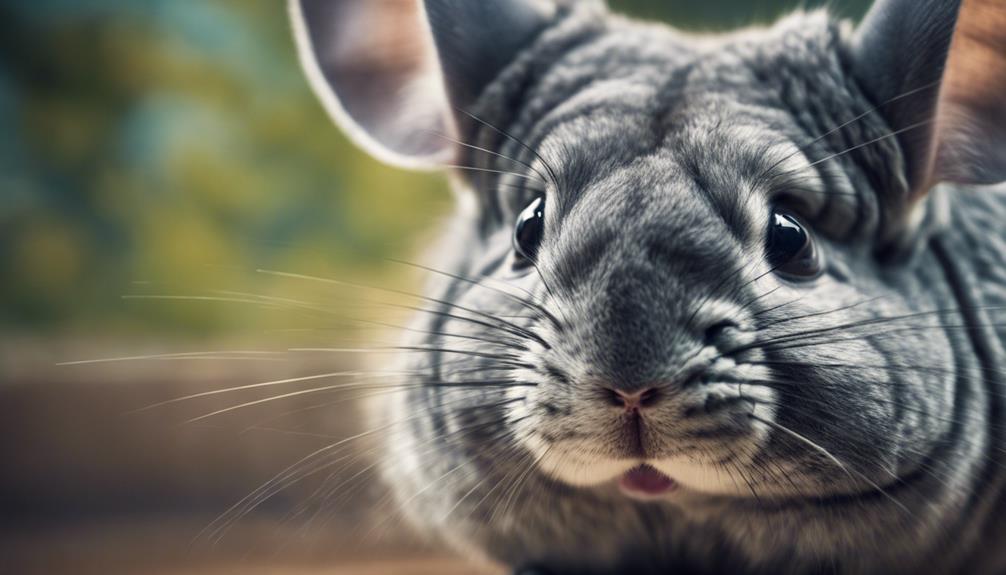
Various factors can contribute to eye discharge in chinchillas, including potential underlying health issues and environmental influences.
It’s crucial to consider the overall health and well-being of the chinchilla when addressing eye discharge.
Seeking veterinary assistance is essential to accurately diagnose the cause and provide appropriate treatment for the chinchilla.
Possible Underlying Health Issues
Excessive eye discharge in chinchillas may indicate an underlying health issue that requires prompt veterinary attention. When dealing with eye discharge in chinchillas, it’s crucial to consider the possible underlying health issues that could be causing this symptom. Common causes of eye discharge in chinchillas include:
- Dental Problems: Malocclusion or overgrown teeth can lead to eye discharge.
- Respiratory Infections: Infections such as pneumonia can manifest with eye discharge.
- Conjunctivitis: Inflammation of the eye’s outermost layer can cause discharge.
- Allergies or Irritants: Environmental factors or allergens can trigger eye discharge.
Understanding these underlying conditions and associated health risks is essential for implementing appropriate treatment options and prevention strategies.
Environmental Factors Affecting
Eye discharge in chinchillas can also be influenced by environmental factors that may contribute to this common symptom. Environmental stressors such as dusty bedding, poor ventilation, or exposure to irritants like smoke can lead to eye discharge.
To prevent eye discharge, chinchilla owners should ensure a clean and dust-free environment, adequate ventilation, and avoid smoking near their pets. Implementing good hygiene practices, such as regularly cleaning the chinchilla’s living space and providing fresh water and food, can also help prevent eye discharge.
If environmental factors are suspected to be the cause of eye discharge, adjusting these conditions and monitoring the chinchilla’s eyes closely may resolve the issue without the need for additional treatment options.
Importance of Veterinary Intervention
Seeking veterinary intervention is crucial for identifying and addressing the common causes of eye discharge in chinchillas. When it comes to eye health management in these small pets, professional assistance is essential. Here are some reasons why veterinary intervention is important:
- Accurate Diagnosis: Veterinarians can conduct thorough examinations to accurately diagnose the underlying cause of eye discharge.
- Tailored Treatment: Veterinary professionals can provide specific treatment plans tailored to the chinchilla’s condition.
- Prevent Complications: Early intervention by a veterinarian can help prevent potential complications associated with eye discharge.
- Professional Advice: Veterinarians offer expert advice on how to manage and prevent eye discharge in chinchillas effectively.
Signs and Symptoms to Watch
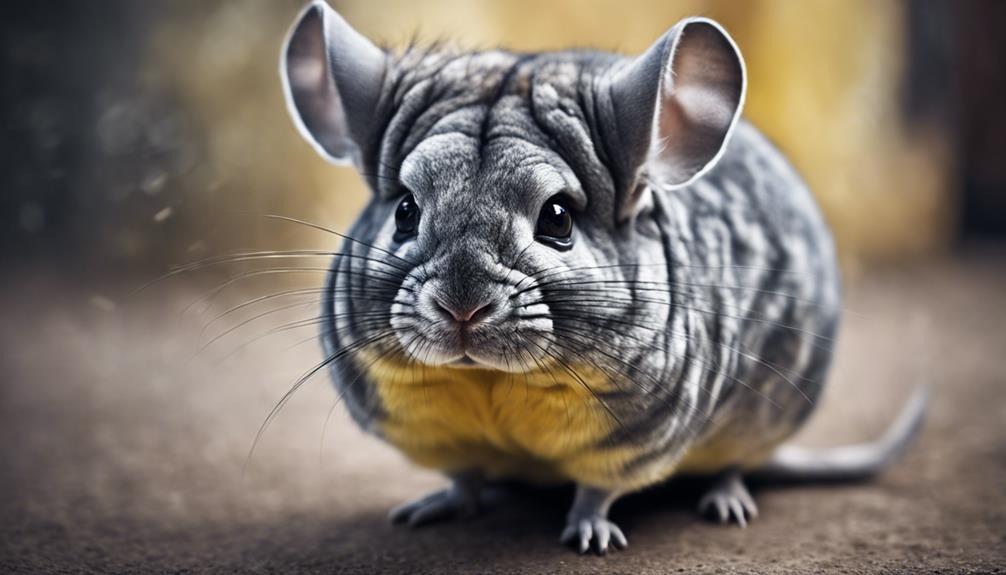
Watching for changes in the appearance of your chinchilla’s eye discharge can provide valuable insights into their health status. Early detection of any abnormalities in the eye discharge is crucial for prompt treatment. One of the key signs to watch for is an increase in the amount of discharge. If you notice a sudden change in the quantity or consistency of the discharge, it could indicate an underlying health issue that requires attention.
Additionally, the color of the discharge is essential to monitor. While some clear discharge is normal, any yellow, green, or bloody discharge warrants immediate veterinary care.
Regular monitoring of your chinchilla’s eye discharge is part of responsible care. By keeping a close eye on this aspect of their health, you can ensure early detection of any problems and facilitate timely treatment. Any persistent changes in the eye discharge shouldn’t be ignored, as they could be indicative of infections, injuries, or other medical conditions.
Prioritizing the observation of your chinchilla’s eye discharge is a proactive approach to maintaining their well-being.
Preventive Measures to Consider
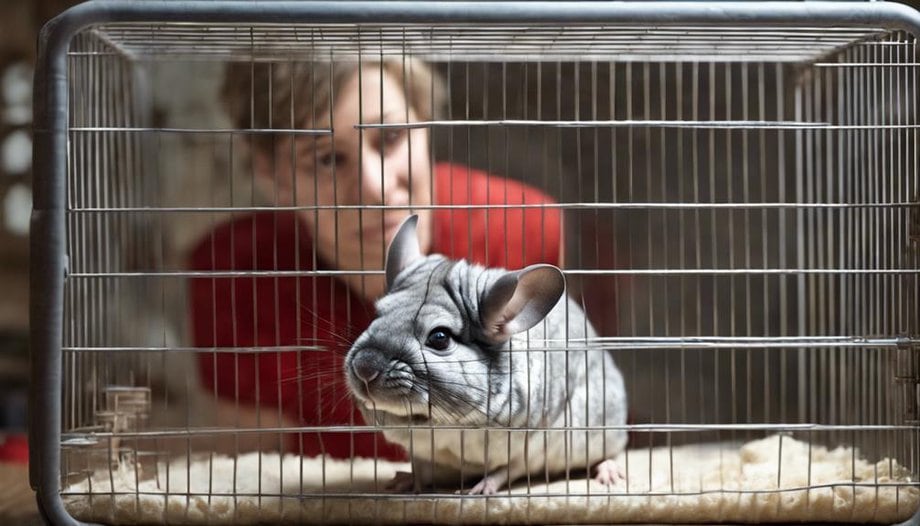
When it comes to preventing eye discharge in chinchillas, understanding the potential causes is crucial. Regularly cleaning your chinchilla’s eyes can help prevent buildup and infections.
It’s highly recommended to consult with a vet if you notice any concerning symptoms or changes in your chinchilla’s eye health.
Eye Discharge Causes
To prevent eye discharge in chinchillas, maintaining proper hygiene practices is essential. Various factors can contribute to eye discharge in these small pets. Understanding the causes can help in preventing this issue.
- Dietary Influences: Ensure your chinchilla’s diet is well-balanced and provides essential nutrients to support overall eye health.
- Environmental Irritants: Keep the chinchilla’s living area clean and free from dust, smoke, or other irritants that can affect their eyes.
- Genetic Predisposition: Some chinchillas may be more prone to eye discharge due to genetic factors; regular check-ups can help in early detection.
- Underlying Health Conditions: Monitor your chinchilla’s overall health, as some illnesses can manifest through eye discharge.
Cleaning Chinchilla Eyes
Maintaining chinchilla eye cleanliness is crucial in preventing eye discharge and promoting overall eye health. Proper hygiene is essential to prevent eye issues in chinchillas.
To clean a chinchilla’s eyes, use a damp, clean cloth or gauze pad to gently wipe away any discharge or debris. It’s important to be gentle to avoid causing any harm to the delicate eye area. Regular eye cleaning should be part of the chinchilla’s grooming routine to prevent the buildup of dirt and bacteria that can lead to eye infections.
Vet Consultation Recommended
Ensuring regular vet consultations for your chinchilla is crucial to proactively address any potential eye issues and maintain their overall eye health. When considering a vet consultation, here are some key points to keep in mind:
- Behavioral concerns: Vets can assess your chinchilla’s behavior to identify any underlying issues affecting their eye health.
- Treatment options: Professionals can provide tailored treatment plans based on your chinchilla’s specific eye condition.
- Dietary considerations: Vets can recommend appropriate diets rich in essential nutrients to support overall eye health.
- Eye health: Regular check-ups can help in early detection of eye problems, ensuring prompt intervention and care for your chinchilla.
Regular consultations can significantly contribute to your chinchilla’s well-being and quality of life.
Seeking Veterinary Care Early
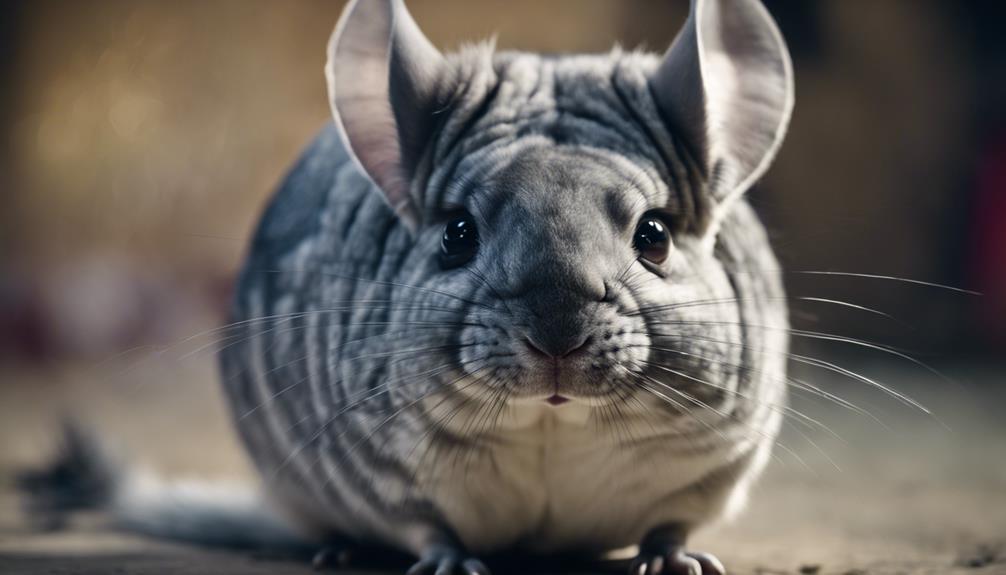
Early veterinary care is crucial when dealing with eye discharge in chinchillas. Early intervention can prevent potential complications and ensure the proper care needed for the chinchilla’s eye health. When a chinchilla shows signs of eye discharge, such as redness, swelling, or excessive tearing, it’s essential to seek veterinary care promptly. A veterinarian experienced in exotic animals will be able to examine the chinchilla’s eyes thoroughly to determine the underlying cause of the discharge.
By seeking veterinary care early, chinchilla owners can address any issues promptly and prevent them from escalating into more severe problems. The veterinarian may recommend treatments such as eye drops, ointments, or oral medications depending on the diagnosis. Additionally, they can provide valuable guidance on how to properly administer the medications and care for the chinchilla during their recovery.
Ignoring eye discharge in chinchillas can lead to discomfort, infections, or even vision loss. Therefore, early veterinary care is essential for maintaining the health and well-being of these adorable pets.
Potential Complications to Avoid
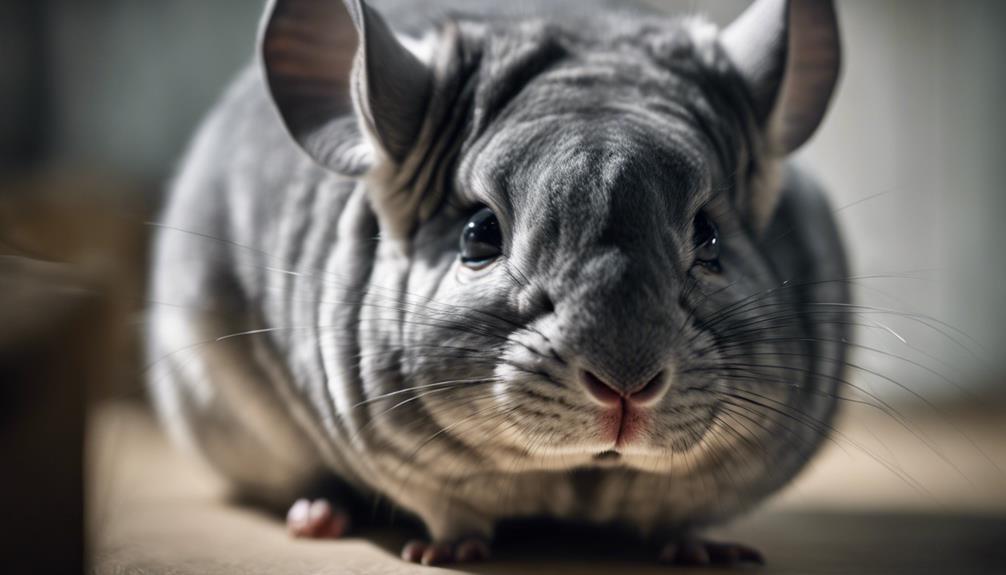
To prevent complications, vigilant monitoring of a chinchilla’s eye discharge and prompt veterinary intervention are crucial. Ignoring eye discharge in chinchillas can lead to potential complications that may harm their overall health and well-being. Early intervention is key to avoiding these issues.
- Corneal Ulcers: Untreated eye discharge can cause corneal ulcers, leading to pain and potential vision impairment for the chinchilla.
- Conjunctivitis: Prolonged eye discharge can result in conjunctivitis, a condition that causes inflammation and discomfort in the eye.
- Secondary Infections: If left untreated, eye discharge can pave the way for secondary bacterial or fungal infections, worsening the chinchilla’s condition.
- Systemic Health Problems: Chronic eye issues can indicate underlying systemic health problems that may require extensive treatment and care.
Maintaining Chinchilla Eye Health
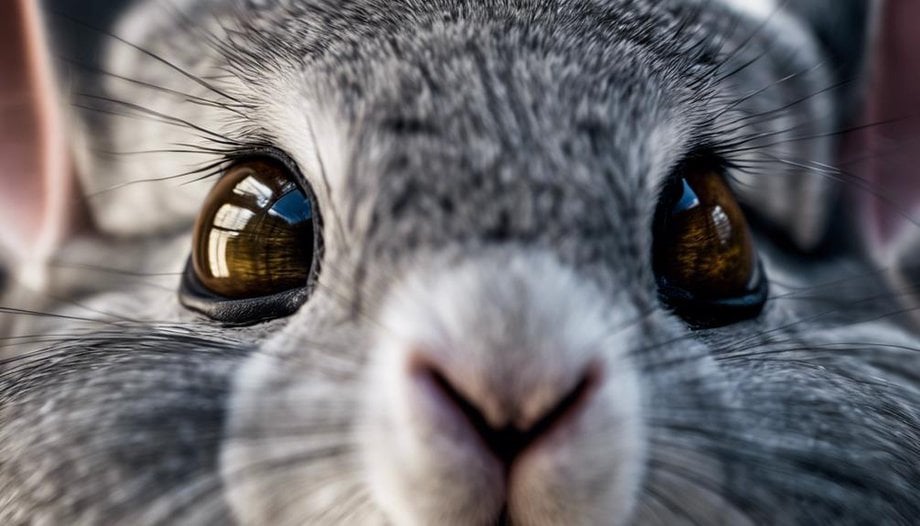
Vigilant monitoring and prompt veterinary intervention for eye discharge in chinchillas are essential in maintaining their overall eye health and preventing potential complications. Proper eye hygiene is crucial to prevent eye infections. Chinchilla owners should regularly check their pets for any signs of discharge, redness, or swelling around the eyes. If discharge is present, it should be gently cleaned with a damp cloth to prevent crust buildup that can lead to further issues.
Ensuring proper nutrition is also vital for maintaining chinchilla eye health. A balanced diet rich in hay, pellets, and fresh vegetables provides essential vitamins and minerals that support overall eye function. Vitamin A is particularly important for eye health, so including foods like carrots and sweet potatoes in their diet can help prevent eye-related issues.
| Eye Hygiene Tips | Proper Nutrition | Key Points |
|---|---|---|
| Regularly check for discharge | Provide a balanced diet | Vigilance is key |
| Clean discharge gently | Include vitamin A-rich foods | Nutrition impacts eye health |
| Avoid harsh cleaning products | Monitor hay and vegetable intake | Prevention is better than cure |
Frequently Asked Questions
Can Chinchilla Eye Discharge Be Contagious to Other Pets or Humans?
Chinchilla eye discharge can be contagious to other pets or humans. Transmission risks exist, and preventive measures are crucial. Cross-species infection poses zoonotic concerns. Prompt veterinary care, isolation, and proper hygiene practices help mitigate these risks.
Are There Any Home Remedies That Can Be Used to Treat Chinchilla Eye Discharge?
When it comes to treating chinchilla eye discharge, a blend of natural remedies can aid in promoting chinchilla eye health. Regular check-ups and preventative measures can help manage eye discharge in chinchillas, ensuring their well-being.
Can Chinchilla Eye Discharge Be a Sign of a More Serious Underlying Health Condition?
Chinchilla eye discharge can indicate serious health issues. It’s crucial to consult a veterinarian for proper diagnosis. Treatment options depend on the underlying cause, ranging from simple eye drops to more complex interventions. Prevention measures help maintain eye health.
How Often Should Chinchilla Eye Health Be Monitored to Catch Any Issues Early?
Regular check-ups are vital for maintaining optimal chinchilla eye health. By scheduling routine visits, owners can catch potential issues early on. Prevention techniques, such as proper hygiene and monitoring for any changes, contribute to overall eye wellness.
Are There Certain Breeds or Age Groups of Chinchillas That Are More Prone to Developing Eye Discharge?
Genetic predisposition and age factors may influence certain breeds or age groups of chinchillas to develop eye discharge. Additionally, environmental influences and diet correlation play a role in promoting or preventing eye health issues in chinchillas.










